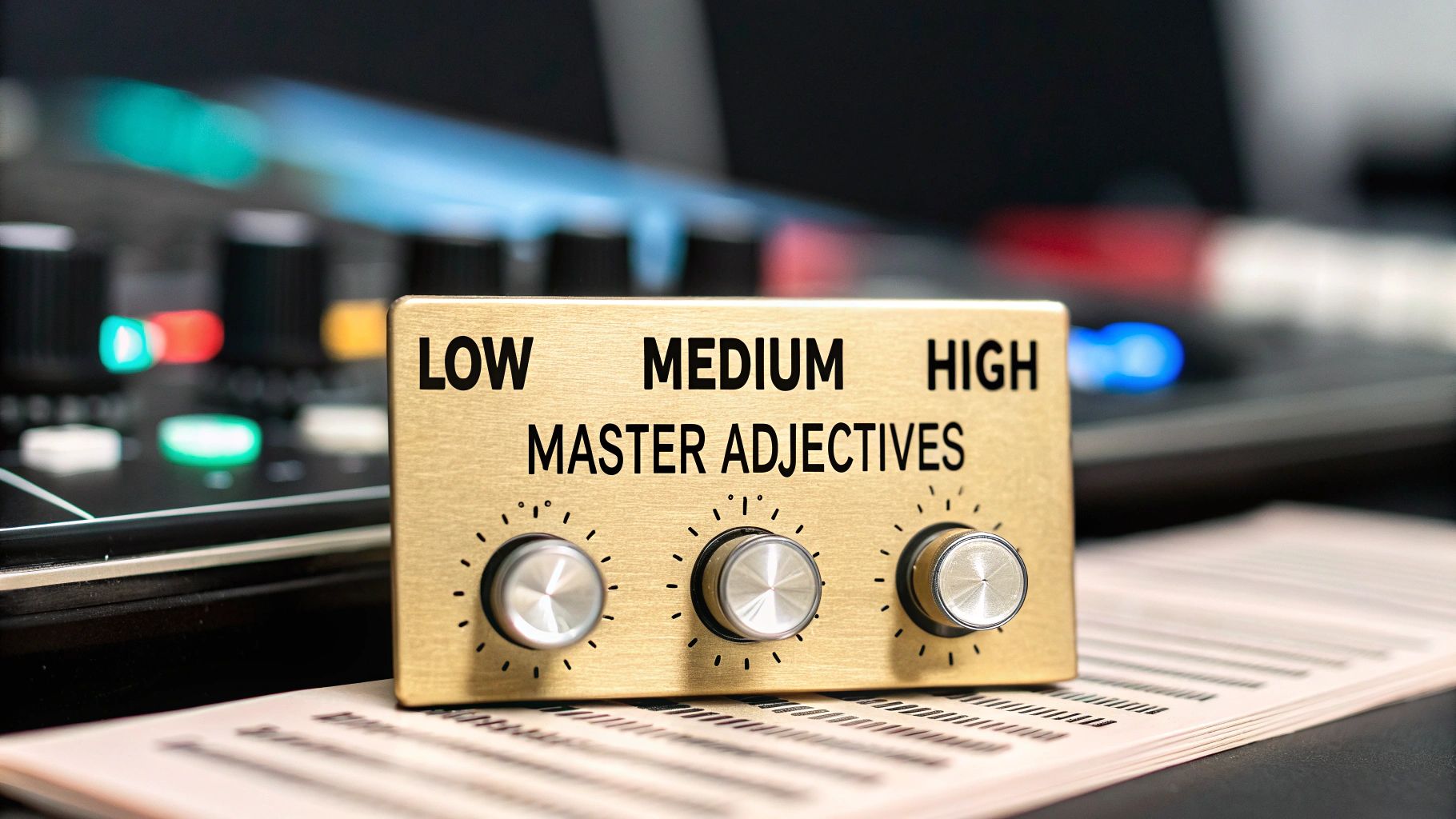Ever tried to argue that your favorite pizza place is better than your friend's, or that one movie was the most boring thing you've ever seen? You were using comparative and superlative adjectives, even if you didn't know their official name.
These aren't just fancy grammar terms; they're the tools we use every day to add detail, make a point, and show how things stack up against each other. They add color and precision to our language.
Your Guide to Comparing with Adjectives
Think of regular adjectives as the default setting. A car is fast. A book is interesting. Simple enough, right?
But what happens when you introduce a second car or another book? That’s where comparatives and superlatives come in. They act like the volume dials for your descriptions. A comparative turns the dial up a notch to compare two things, while a superlative cranks it all the way to the max to single one out from a whole group.
This is how we show different levels of quality. A car is fast, but the new model is faster. Out of all the cars on the lot, that sports car is the fastest. This simple system of scaling our descriptions is essential for communicating clearly.
The Two Paths of Comparison
So, how do you actually form these adjectives? It's easier than you think. Most adjectives follow one of two main paths, and it usually just depends on how long the word is.
- Short Adjectives: For short, punchy words (usually one syllable like big, hot, or nice), you just add an ending. They get an -er for the comparative and an -est for the superlative. Easy.
- Long Adjectives: For longer words with two or more syllables (like beautiful or expensive), we don't tack on an ending. Instead, we put more or most in front of them.
Getting this basic distinction down is the key to unlocking almost everything you need to know about comparing things in English.
Key Idea: Comparatives and superlatives help us rank and differentiate. Comparatives are for a head-to-head matchup between two things. Superlatives are for picking the winner out of a group of three or more.
To get a clearer picture, let's lay it all out. The table below gives you a quick snapshot of the three "degrees" of comparison and how they work. Think of this as your roadmap for the rest of our journey.
Quick Guide to Degrees of Comparison
| Degree | Function | Example Sentence |
|---|---|---|
| Positive | Describes one thing on its own. | The blue car is fast. |
| Comparative | Compares two things. | The red car is faster than the blue car. |
| Superlative | Compares three or more things. | The black car is the fastest car on the track. |
As you can see, we start with a simple description and build on it to make our language more specific and dynamic. Now, let's dive into the rules that govern how these forms are made.
How to Form Comparative Adjectives
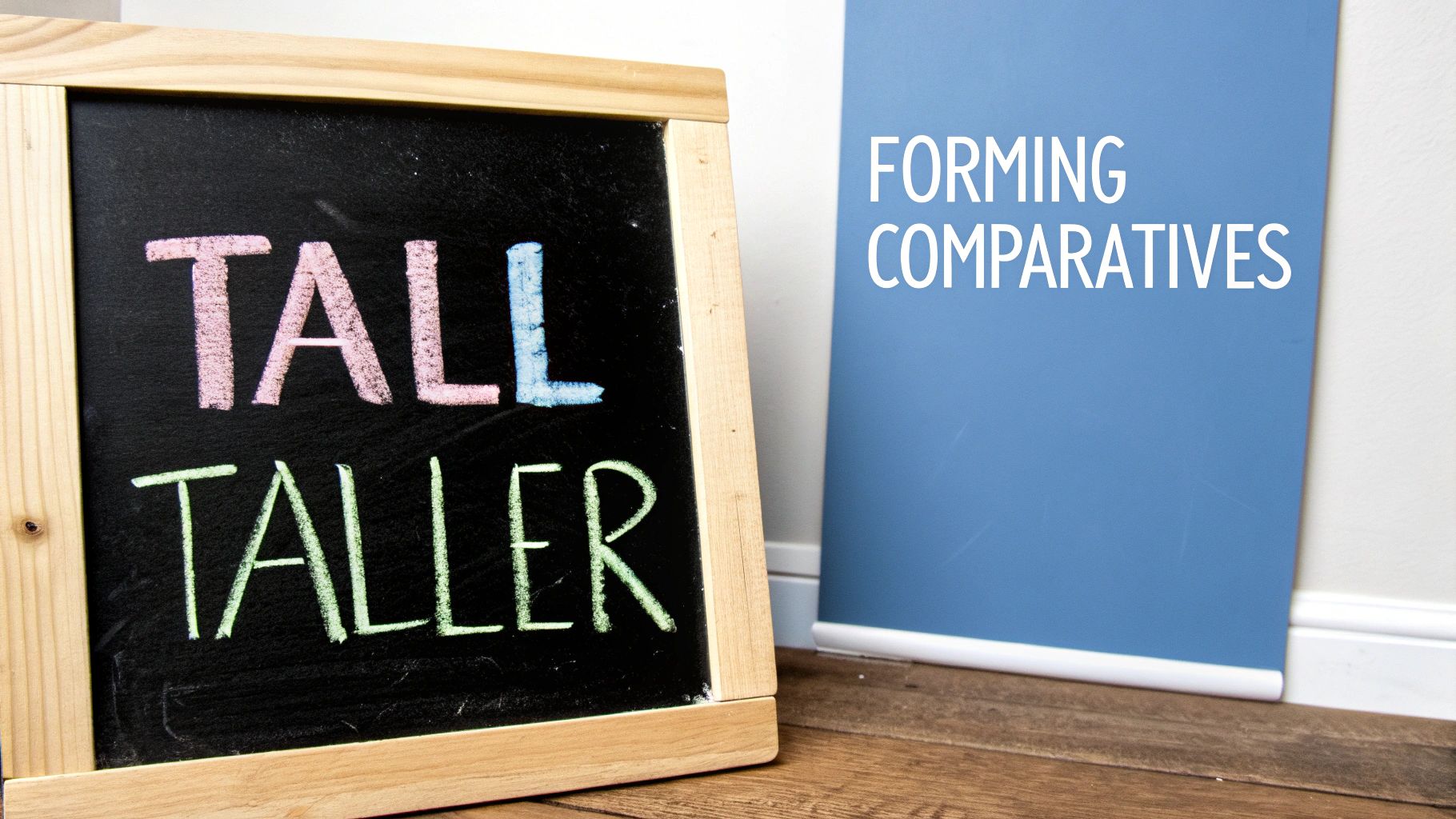
Learning how to form comparative adjectives is all about understanding a few core patterns. Once you get the hang of them, making comparisons becomes second nature. It really boils down to the length of the adjective you're working with.
For most short, one-syllable adjectives, the rule is wonderfully simple. Just add -er to the end. Think of words like fast, tall, or loud.
- fast becomes faster
- tall becomes taller
- old becomes older
This is the most common rule you'll encounter, and it covers a huge number of adjectives. It's the difference between saying "The red car is fast" and "The blue car is faster."
Spelling Rules for One-Syllable Words
Of course, English loves its little exceptions. While adding "-er" is the main idea, there are a few spelling tweaks you need to master to get it right every time.
First, if your one-syllable word already ends in an -e, you don't need another one. Just tack on an -r.
- nice becomes nicer
- large becomes larger
- late becomes later
Next, pay close attention to adjectives that end in a single vowel followed by a single consonant (what some call the CVC pattern). For these words, you have to double that final consonant before adding -er. This little trick helps keep the original vowel sound short and punchy.
- big becomes bigger
- hot becomes hotter
- sad becomes sadder
Finally, if an adjective ends with a consonant followed by a -y, the rule is to swap the 'y' for an 'i' and then add -er.
- dry becomes drier
- shy becomes shyer
Quick Tip: Getting these comparatives right is all about looking at the last one or two letters of the adjective. These spelling changes are small, but they make a huge difference in how the word looks and sounds.
Handling Longer Adjectives
So, what happens when you have a longer word? Trying to add "-er" to adjectives like beautiful or expensive just doesn't work. The results (beautifuler?) are clunky and sound completely unnatural. English has a much more elegant solution.
For most adjectives with two or more syllables, you simply place the word more in front of them. The original adjective doesn't change at all.
- modern becomes more modern
- interesting becomes more interesting
- difficult becomes more difficult
This approach keeps your sentences flowing smoothly. You'd say, "This book is more interesting than the last one," which sounds far better than the alternative.
The Tricky Two-Syllable Words
This is where things can get a little fuzzy. Some two-syllable adjectives can be a bit rebellious and don't neatly fit one rule.
The biggest group to watch for are two-syllable words that end in -y. These almost always act like their one-syllable cousins: you change the 'y' to an 'i' and add -er.
- happy becomes happier
- busy becomes busier
- easy becomes easier
A few other two-syllable words, particularly those ending in -le, -er, or -ow, can also take the "-er" ending.
- simple becomes simpler
- clever becomes cleverer
- narrow becomes narrower
When you're not sure about a two-syllable word, using more is usually the safer option. Over time, as you read and listen to more native English, you’ll start to get a feel for which form sounds the most natural.
How to Form Superlative Adjectives
While comparatives are perfect for a one-on-one showdown, superlatives are for crowning a champion. They single out one item from a group of three or more as having the absolute highest degree of a quality. Think of it as shifting your question from "Which of these two is faster?" to "Which is the fastest of all?"
The first and most important rule for superlative adjectives is that they almost always need the definite article "the" right before them. You wouldn't say, "She is fastest runner." It has to be, "She is the fastest runner." That little word is a big deal—it signals that you’re pointing to the one and only.
Just like with comparatives, the rules for forming superlatives are mostly about how many syllables the adjective has. For short, one-syllable adjectives, you just tack on the suffix -est.
- cold becomes the coldest
- strong becomes the strongest
- small becomes the smallest
Fine-Tuning Superlative Spelling
The good news is that the spelling tweaks for superlatives are nearly identical to the ones for comparatives. If you’ve got those down, this will be a breeze. The only thing that changes is the ending: from "-er" to "-est".
If a short adjective already ends in -e, just add -st. No need for a double 'e'.
- large becomes the largest
- nice becomes the nicest
- brave becomes the bravest
For adjectives with that classic consonant + vowel + consonant (CVC) spelling, you’ll need to double the final consonant before adding -est. This keeps the vowel sound short and snappy.
- big becomes the biggest
- hot becomes the hottest
- thin becomes the thinnest
And for words that end with a consonant followed by -y, you’ll swap the 'y' for an 'i' and then add -est.
- dry becomes the driest
Seeing how these rules mirror each other helps build your intuitive feel for English grammar.
Superlative vs. Comparative: A comparative (
-er) puts two things head-to-head ("This car is faster than that one"). A superlative (-est) picks one winner out of a group of three or more ("This is the fastest car in the entire race").
Forming Superlatives with Longer Adjectives
So what about those longer, more descriptive words? If you used "more" for comparatives, you’ll use its partner, most, for superlatives. For the majority of adjectives with two or more syllables, you simply place "the most" in front of the word.
This handy pattern works for a huge number of adjectives, so it's a reliable tool to have in your pocket.
- beautiful becomes the most beautiful
- expensive becomes the most expensive
- important becomes the most important
This structure lets you talk about the peak quality of something without creating a clunky, unnatural-sounding word. "This is the most interesting book" sounds a lot more natural than "the interestingest book," right?
Two-Syllable Words Revisited
Those tricky two-syllable words we met earlier also follow a familiar path. The ones that end in -y act just like short adjectives: change the 'y' to an 'i' and add -est.
- happy becomes the happiest
- busy becomes the busiest
- early becomes the earliest
A few others ending in -le, -er, or -ow can also take the -est ending, though you might occasionally hear "most" used with them as well.
- simple becomes the simplest
- clever becomes the cleverest
- narrow becomes the narrowest
By getting a handle on these parallel structures, you can form both comparative and superlative adjectives with confidence. For some hands-on practice, you might want to try tools like the English Fluent grammar tutor on Telegram, which has exercises that can help make these patterns second nature.
Understanding Irregular Adjectives
Just when you think you have a handle on the rules, English grammar likes to throw a curveball. That's definitely the case with irregular adjectives. Some of the most common words we use to describe things completely ignore the standard -er/-est or more/most patterns.
Instead of following the rules, these words have their own unique forms. Think of them as the rebels of the adjective world. The good news? You don't have to learn a long list of them. For everyday conversation, you only need to memorize a few key players.
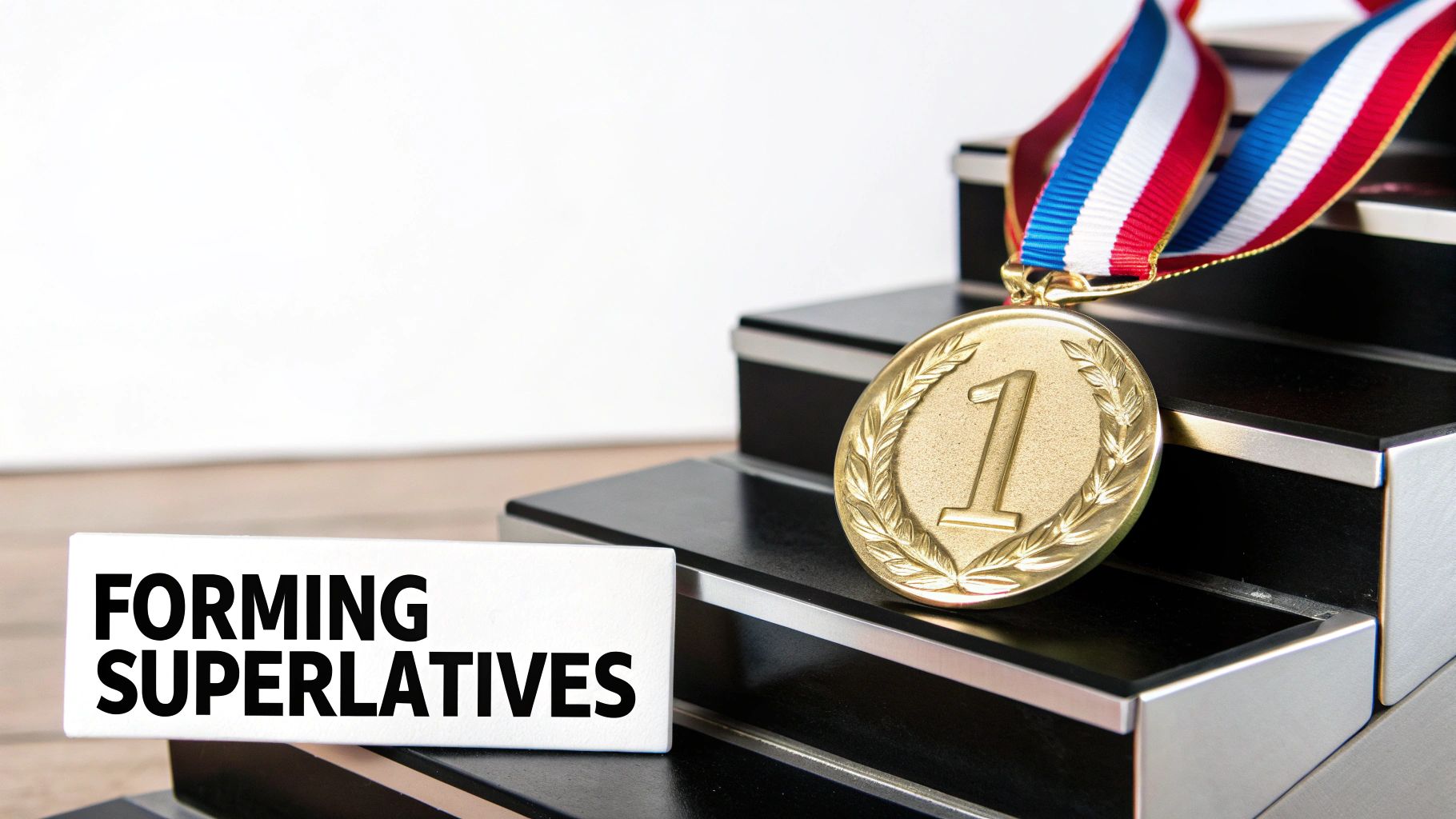
The Most Common Irregular Adjectives
Let's start with the big three. If you can master these, you'll be well on your way to sounding more fluent and natural. These pop up all the time in conversation and writing.
Here are the primary irregular adjectives you need to know:
- Good: becomes better (comparative) and the best (superlative).
- Bad: changes to worse (comparative) and the worst (superlative).
- Far: has two options, farther/further (comparative) and the farthest/furthest (superlative).
You'd get some strange looks for saying "gooder" or "the baddest." These words have their own special forms that are baked right into the English language.
Let's see them in action with "good":
- Positive: "This is a good cup of coffee."
- Comparative: "This cup is better than the one I had yesterday."
- Superlative: "This is the best coffee I've ever had."
It works the same way for "bad":
- Positive: "The weather was bad on Monday."
- Comparative: "The weather was worse on Tuesday."
- Superlative: "It was the worst storm of the entire year."
Key Insight: Irregular adjectives are not formed by adding a simple suffix. Their comparative and superlative versions are entirely different words. This is a case where memorization, not rule-following, is your best strategy.
Distinguishing Between Farther and Further
The adjective "far" is a special case because it has two different comparative and superlative forms. The difference between them can be a little fuzzy, but there's a simple guideline that usually helps.
Farther and the farthest almost always refer to a physical, measurable distance.
- "My house is farther down the street than yours."
- "Which planet is the farthest from the sun?"
Further and the furthest, on the other hand, are typically used for metaphorical or abstract distances—think of it as meaning "more" or "to a greater extent."
- "Do you have any further questions?"
- "We need to research this topic further."
While this rule is a great starting point, it's worth knowing that many native speakers now use "further" for both physical and abstract concepts. If you're ever in doubt, using "further" is usually the safer bet.
When "Mistakes" Aren't Really Mistakes
Have you ever caught someone saying something like "more better" or "the most worstest"? While these are technically incorrect in standard English, they have a fascinating history. This is a real phenomenon called a "double comparative," where someone uses two markers (like more and -er) to add extra emphasis.
Believe it or not, these forms were perfectly acceptable centuries ago. Even Shakespeare used them, writing of "his more braver daughter" in The Tempest. As English evolved, the rules were standardized, and these double forms fell out of common use. However, you can still hear them in certain modern dialects, where they add a specific, idiomatic punch. You can explore more about their historical context to see just how much English grammar has changed.
This is a great reminder that language is always alive and changing. What's considered a "mistake" today might have been standard practice in the past, showing that the rules we learn are often just a snapshot of a living, breathing system.
Choosing Between '-er/-est' and 'More/Most'
Ever wondered why we say someone is happier but a view is more beautiful? It feels instinctual, doesn't it? While many of us learn the "syllable rule" in school, the real reason behind choosing -er/-est versus more/most is a fascinating mix of a word's sound, its history, and even how common it is.
The simplest rule of thumb is, of course, word length. Short, punchy, one-syllable adjectives almost always take the -er/-est endings. These are the bedrock words of English—old, familiar, and straight to the point.
This image neatly lays out how these basic one-syllable words change.
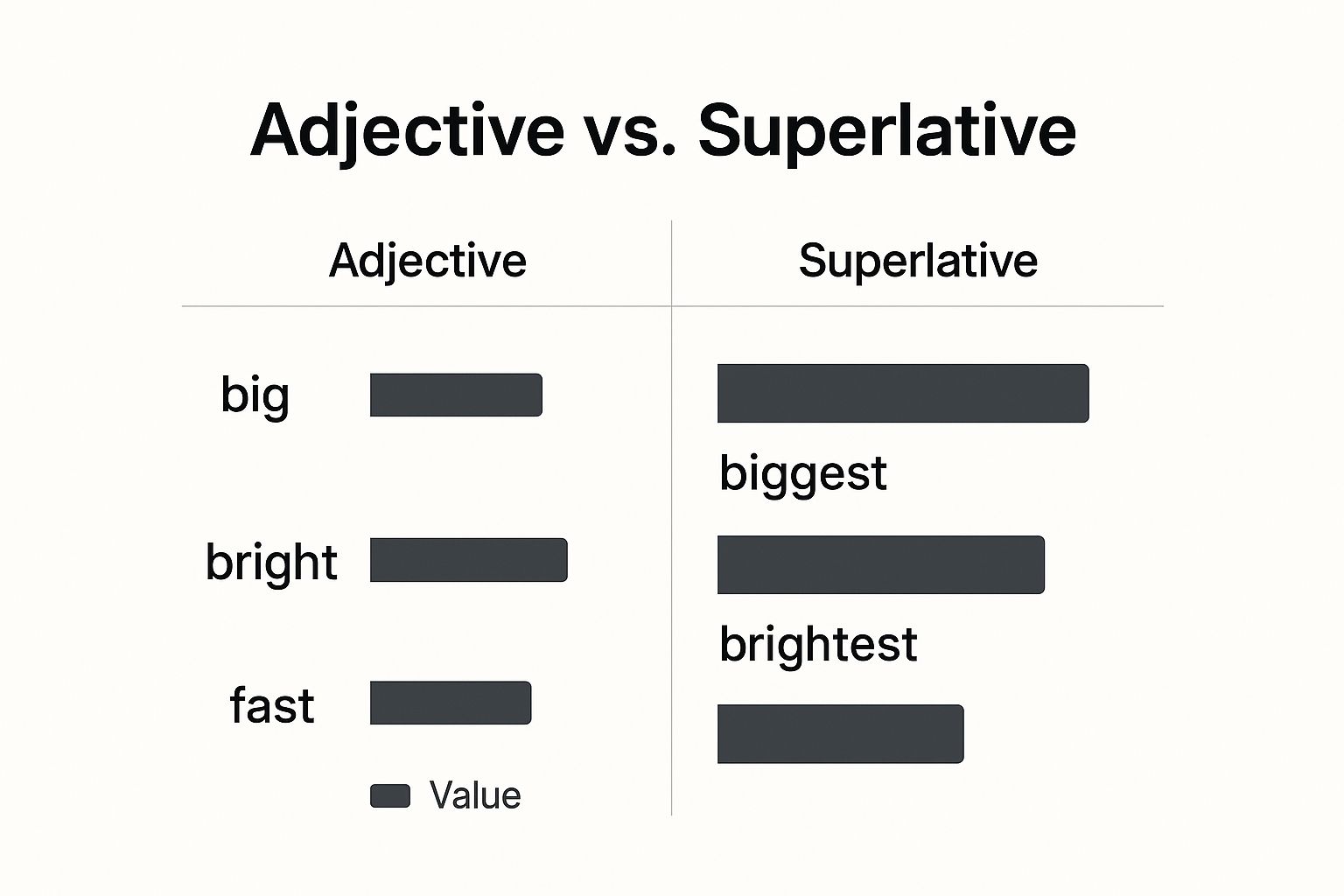
As you can see, it's a pretty straightforward process for these short, common words. It's the most fundamental pattern we have for making comparisons in English.
An Adjective's Roots and Rhythm
Looking past syllable count, the very sound and origin of a word often dictate its comparative form. Words that use the -er/-est endings (the "synthetic" form) are typically rooted in Old English or Germanic languages. Think about words like old, young, strong, and wise. They feel ancient and foundational because they are.
In contrast, longer adjectives that need the help of more/most (the "analytic" form) usually have a different backstory. Many of these words, like beautiful, intelligent, and delicious, were adopted from French or Latin. Tacking an extra suffix onto these already multi-syllable words would just sound clunky and awkward. Using more or most keeps the original word's rhythm intact.
Key Takeaway: The choice often tells a story about the word's journey into English. Words with Germanic roots tend to take endings, while those with Latin origins prefer helper words.
To make this clearer, let's look at the general tendencies in a table.
Choosing Your Comparison Form '-er/-est' vs. 'More/Most'
| Characteristic | Tends to Use '-er/-est' (Synthetic) | Tends to Use 'More/Most' (Analytic) |
|---|---|---|
| Syllable Count | One syllable (e.g., fast, tall, cheap) | Three or more syllables (e.g., expensive, interesting) |
| Two-Syllable Words | Often those ending in -y, -le, -er, or -ow (e.g., happy, simple, clever, narrow) | Often those ending in -ful, -ing, -ous, -ive (e.g., careful, boring, famous, creative) |
| Word Origin | Primarily Germanic/Old English roots | Primarily Latin/French roots |
| Sound & Feel | Short, punchy, foundational words | Longer, more complex, or "formal" sounding words |
This table provides a great starting point, but remember, English is full of exceptions and gray areas.
When Both Forms Are Correct
Some two-syllable adjectives are wonderfully flexible, allowing for both forms. For instance, you could describe someone as cleverer or more clever. You might call a solution "the simplest" or "the most simple." Both are perfectly fine.
So, which one should you use? The choice often boils down to rhythm, context, and personal style.
- Simpler feels quick, direct, and a bit more informal.
- More simple might be used when you want to place extra emphasis on the word "simple."
- Quieter is the everyday, common choice.
- More quiet can sound more deliberate, formal, or even poetic.
Interestingly, linguists have found subtle patterns even here. Adjectives ending in "-y" (like happy or easy) have an overwhelming preference for -er/-est. And according to some linguistic research, an adjective's popularity can also play a part; more frequently used words often lean toward the -er form. You can explore the full research on these linguistic patterns if you're curious.
Ultimately, the best way to master this is to develop an ear for the language. The more you read and listen, the more you'll instinctively know whether friendlier or more friendly sounds right in a given sentence. When in doubt, especially with those tricky two-syllable words, using more is often the safer, more modern-sounding bet.
Common Mistakes and How to Fix Them
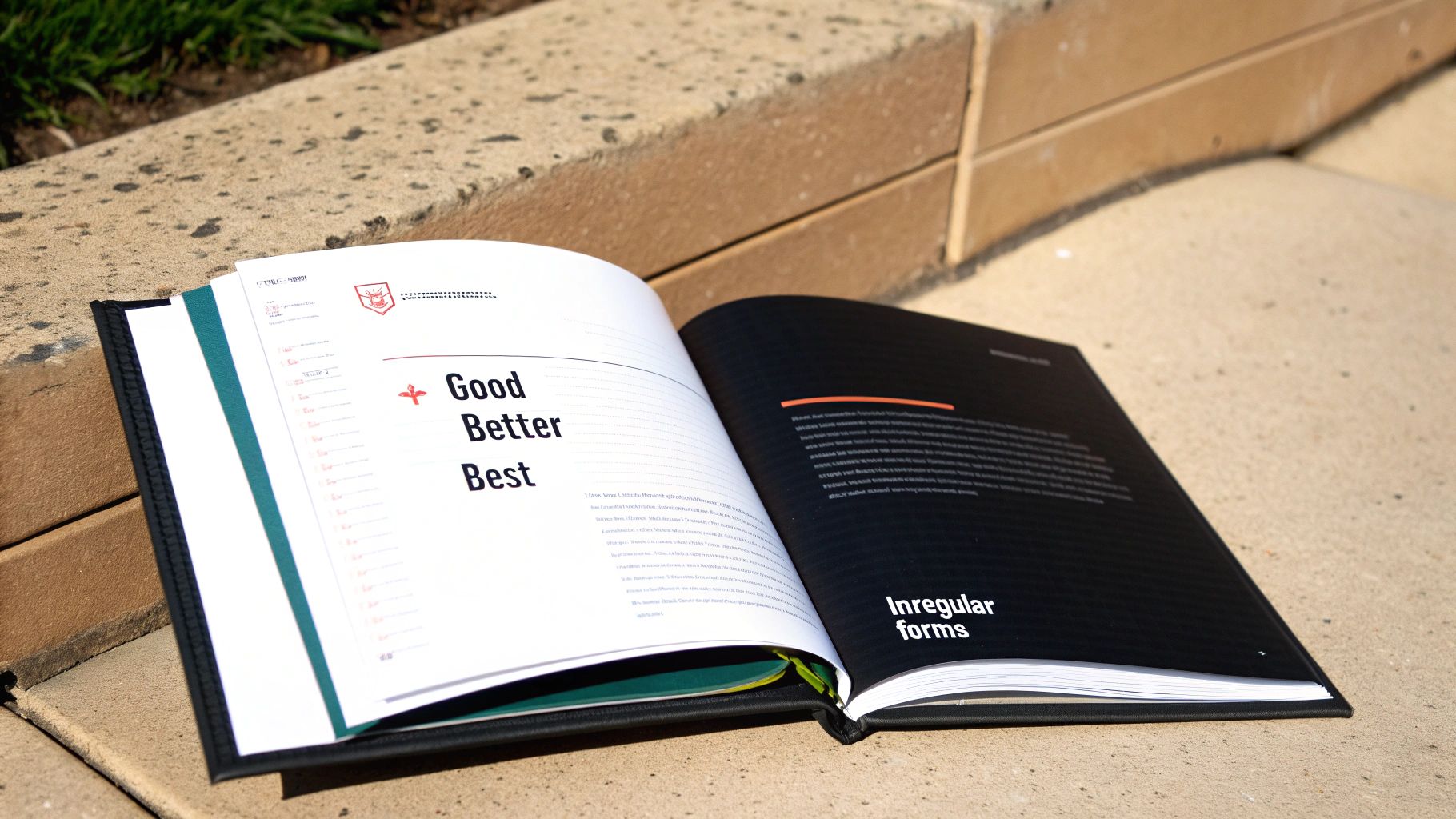
Knowing the rules for comparative and superlative adjectives is one thing, but using them correctly in the wild is another. This is where we all tend to stumble. Think of this as your personal troubleshooting guide—by recognizing these common slip-ups, you'll be able to spot and fix them in your own writing, making your English sound that much more polished.
Let's dive into a few of the most frequent hiccups and how to smooth them out. Honestly, every mistake is just a chance to get better.
Forgetting "The" with Superlatives
This is, without a doubt, the most common error I see. When you use a superlative, you’re pointing to one specific thing that is the "most" of something. To do that, you need the definite article the. Leaving it out just makes the sentence feel a bit off.
- Mistake: "She is fastest runner on the team."
- Correction: "She is the fastest runner on the team."
The fix is as simple as it looks: always pop the in front of a superlative like fastest, most interesting, or worst. It's a small word that does a lot of heavy lifting, signaling that you're talking about the one and only.
Why it matters: The word "the" tells your listener you're talking about a specific, unique person or thing. Saying something is "the best" or "the tallest" pinpoints that single item, so "the" is absolutely essential to get the meaning across.
Comparing Unrelated Things
For a comparison to make sense, you have to compare apples to apples. A classic blunder is what's called an illogical comparison, where the two things you're trying to compare don't actually match. This happens a lot when we compare someone's possession to another person.
- Mistake: "His car is faster than his brother."
- Correction: "His car is faster than his brother's car." or even better, "His car is faster than his brother's."
The first sentence is literally comparing a car to a human being, which doesn't make sense. The fix is to make sure you're comparing a car to another car. Using the possessive form ("his brother's") is the slickest way to do this without having to repeat the word "car."
Mixing Up "Than" and "Of"
Choosing the right little word—the preposition—is crucial for a clear comparison. The rules here are pretty straightforward once you see them laid out.
Use "than" for comparatives: This is your go-to word for introducing the second thing in a direct comparison between two items.
- Example: "This book is more interesting than the last one."
- Example: "She is taller than her sister."
Use "of" or "in" for superlatives: These words are used to define the entire group that you're picking the "most" from.
- Example: "He is the smartest student in the class."
- Example: "This is the best day of my life."
Getting these mixed up can really muddy the waters. Just remember this simple rule: comparatives take than, and superlatives use in or of to show the group. It's a small detail that keeps your comparisons sharp and correct.
Frequently Asked Questions
Even after you get the hang of the basics, a few tricky questions about comparative and superlative adjectives almost always come up. Let's walk through some of the most common ones to clear up any confusion and get you using them like a pro.
How Do I Make Downward Comparisons?
So far, we've talked about making things "more" or the "most." But what about when you want to say the opposite? That's where less and the least come in.
Think of them as the universal tools for downward comparison—they work with just about any adjective, whether it's long or short.
- Less is your go-to for comparing two things. For example, "This path is less scenic than the one by the coast."
- The least is for picking one thing out of a group of three or more. You might say, "Of all the quotes we got, this one is the least expensive."
It's a simple and effective way to show something ranks lower without having to search for an opposite word.
What Is the Difference Between Farther and Further?
Ah, the classic question. This one trips up even native speakers, but the traditional distinction is actually quite helpful for making your writing more precise.
A good rule of thumb: Use farther for physical distance you can actually measure. Use further for metaphorical or figurative distance, like time, depth, or quantity.
- Farther (Physical Distance): "The finish line is farther away than it looks."
- Further (Metaphorical Distance): "Do you have any further questions for me?"
Honestly, in everyday conversation, you'll hear them used interchangeably. But if you want to be precise, stick to that rule. When in doubt, further is almost always a safe bet.
Can All Adjectives Be Compared?
That's a fantastic question, and the short answer is no. Some adjectives are what we call "absolute" or "ungradable."
They describe all-or-nothing states. There's no middle ground. Think of it like a light switch—it's either on or off.
Words like these can't be graded:
- Unique: Something is either one of a kind, or it isn't. It can't be "more unique."
- Perfect: By definition, perfection is a complete state.
- Impossible: A task is either possible or it's not.
- Dead: This is a final, absolute state.
You'd sound pretty strange saying something was "deader" or "the most impossible." These words already express the highest degree of a quality all by themselves.
Ready to put all this into practice? The absolute best way to get comfortable with comparative and superlative adjectives is to use them again and again. With English Fluent, you can work through exercises built on real-world scenarios and get feedback on the spot. It's a great way to catch mistakes and build confidence right from your phone. Check out the English Fluent tutor on Telegram to start practicing today.
Article created using Outrank
